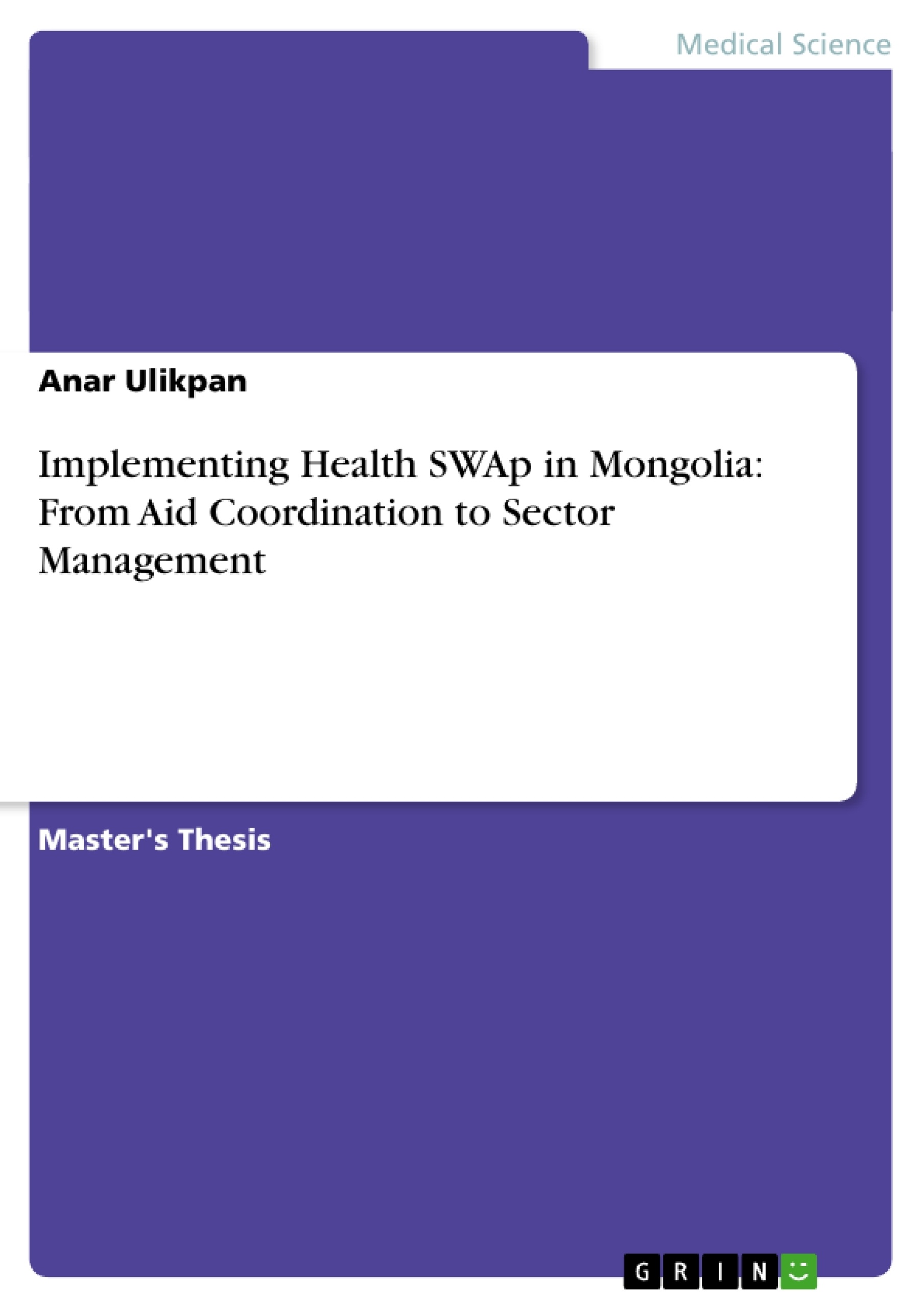This dissertation intends to contribute to improving sector-wide management and aid coordination in health. The dissertation objectives are: 1. To review the key issues related to sectoral management and aid coordination in the Mongolian health sector 2. To examine different frameworks and international experiences in implementing SWAp 3. To appraise likely options for implementing health SWAp in Mongolia 4. To propose a Road map to initiate the implementation of a SWAp in Mongolia
Inhaltsverzeichnis (Table of Contents)
- Chapter One: Introduction and Methodology
- Introduction
- Aim and objectives of the study
- Expected outputs
- Methodology and study limitations
- Study framework and techniques
- Literature search methodology and criteria
- Information sources
- Limitations of the study
- Structure of the dissertation
- Conclusion
- Chapter Two: Problem Analysis
- Introduction
- Country information
- Structure and function of the health sector
- Problem web
- Situation analysis
- Policy framework
- Expenditure framework
- Institutional framework
- Capacity building in monitoring and evaluation
- Conclusion
- Chapter Three: International Experiences In SWAP
- Introduction
- SWAP definitions
- History of SWAPs
- Different forms of SWAPs
- SWAPs versus project aid
- Government and donor perspectives
- SWAPs: key elements
- SWAPs and...
- Conclusion
- Chapter Four: Feasibility Study And Option Appraisal To Implement SWAP In Mongolia
- Introduction
- SWAP stages: where are we now?
- Feasibility assessment for SWAP implementation in mongolia
- Option appraisal for the type of SWAP and its management
- Conclusion
- Chapter Five: Recommended strategy to implement SWAPs
- Introduction
- The objectives and rationale
- Road map for SWAPs
- Coordination mechanism
- Conclusion
Zielsetzung und Themenschwerpunkte (Objectives and Key Themes)
This dissertation aims to analyze the feasibility of implementing a Sector-Wide Approach (SWAP) in Mongolia's health sector. It examines the current state of the Mongolian health system, drawing on international experiences with SWAPs to propose a tailored implementation strategy.
- Analysis of the Mongolian health sector's current structure, challenges, and opportunities.
- Comparative study of international experiences with SWAP implementation.
- Feasibility assessment of a SWAP in the context of Mongolia's health policy, expenditure, institutional capacity, and aid coordination.
- Development of a recommended strategy for implementing a SWAP in Mongolia's health sector.
- Exploration of the various elements of a SWAP implementation, including policy, expenditure, institutional and capacity building frameworks.
Zusammenfassung der Kapitel (Chapter Summaries)
Chapter One provides an introduction and outlines the methodology used in the study. Chapter Two performs a problem analysis of the Mongolian health sector, examining its policy, expenditure, and institutional frameworks. Chapter Three explores international experiences with SWAPs, highlighting different approaches and key elements. Chapter Four assesses the feasibility of implementing a SWAP in Mongolia, analyzing its different elements. Chapter Five presents a recommended strategy for SWAP implementation in Mongolia.
Schlüsselwörter (Keywords)
Sector-Wide Approach (SWAP), Health Sector Reform, Mongolia, Health Policy, Health Financing, Institutional Development, Capacity Building, Aid Coordination, Millennium Development Goals (MDGs), Decentralization.
Frequently Asked Questions
What is a Sector-Wide Approach (SWAp)?
SWAp is a method of aid coordination where all significant funding for a sector supports a single policy and expenditure program under government leadership.
What are the objectives of implementing SWAp in Mongolia?
The goals are to improve aid coordination, strengthen sector management, and align donor support with Mongolia's national health policies and Millennium Development Goals.
How does SWAp differ from traditional project aid?
Unlike project aid, which is often fragmented, SWAp focuses on the entire sector and uses common procedures for planning, implementation, and evaluation.
What is the "Road Map" proposed in the dissertation?
The Road Map is a strategic plan to initiate SWAp implementation, outlining necessary steps for policy, expenditure, and institutional frameworks.
What are the main challenges for Mongolia's health sector?
Key issues include institutional capacity, the need for better monitoring and evaluation, and the coordination of multiple international donors.
- Quote paper
- Anar Ulikpan (Author), 2006, Implementing Health SWAp in Mongolia: From Aid Coordination to Sector Management, Munich, GRIN Verlag, https://www.grin.com/document/182226



